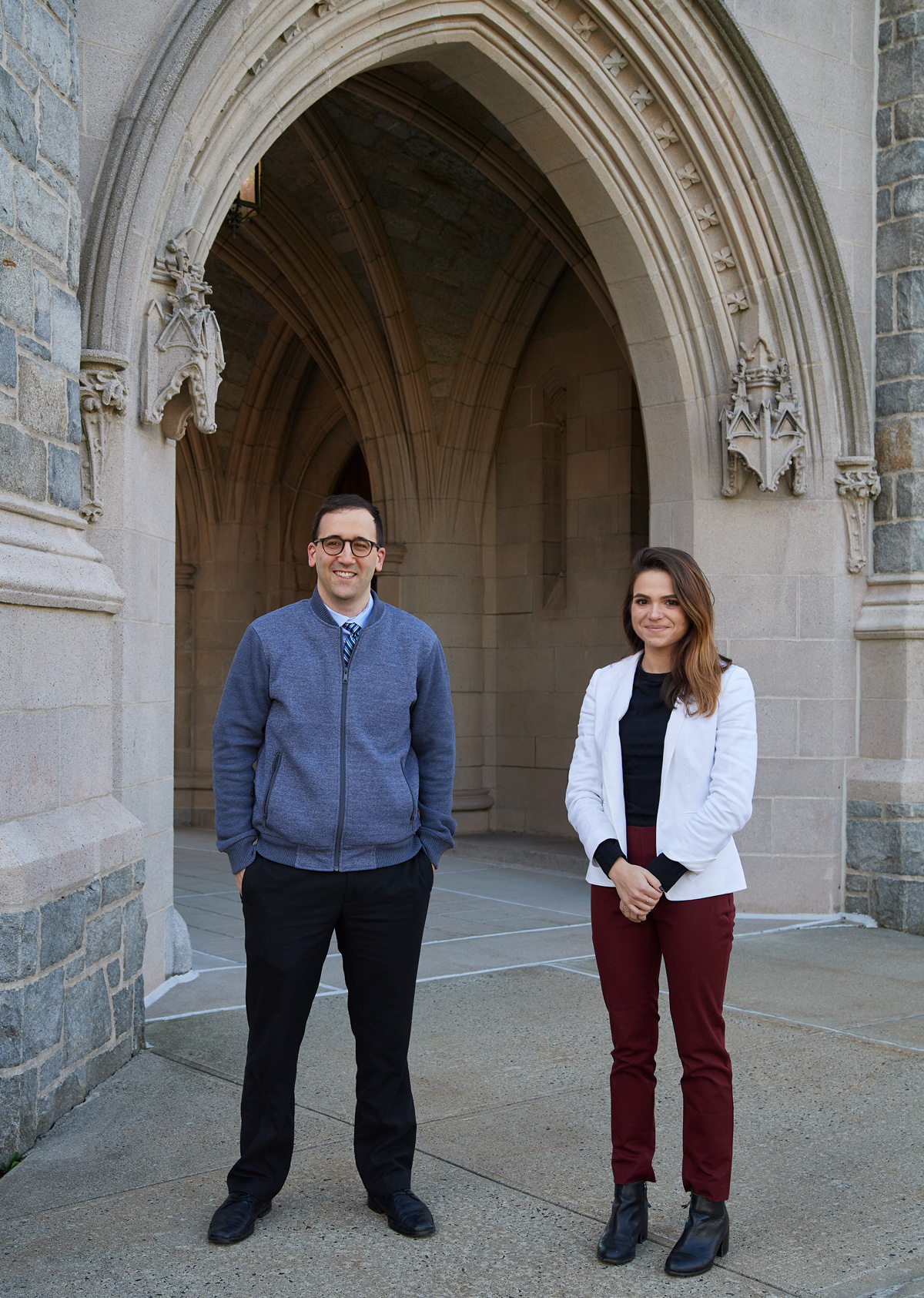Monopoly Busters

Anti-monopoly crusaders Daniel Hanley, left, and Jackie Filson at the UConn Law School in Hartford last December.
America's economy is dominated by monopolies like Google and Tyson Foods that harm workers, suppress innovation, and threaten democracy, say Daniel Hanley '12 (BUS), '19 JD and Jackie Filson '16 (CLAS). The alums lead a growing anti-monopoly movement at the Open Markets Institute, a Washington-based nonprofit seeking to restore antitrust laws to ensure a fair and equitable distribution of opportunity, wealth, and power. We asked these alumni about the growing movement and the exciting work they're doing.
How did each of you end up working at Open Markets?
Daniel:Â After graduation, I committed myself to public service, joining Teach For America in Lowndes County, Alabama. There I came to understand how monopolistic companies such as Walmart are destroying economic opportunities for individuals. I became curious about how to use antitrust law to tame dominant corporations, so I pursued my law degree at UConn where I took classes with exceptional professors, such as Alexandra Lahav, James Kwak, Hillary Greene, and Robert Langer, who taught me antitrust concepts and how they can remedy broader social injustices.
Jackie: Studying human rights and English set me up perfectly for my first job in strategic communications for Food & Water Watch, an environmental advocacy organization based in Washington, D.C. I learned a lot there about the governmental failures that allow giant corporations to monopolize markets while treating workers poorly and manipulating prices. That's how I ended up at Open Markets working to stop Big Ag, Big Tech, Big Pharma, Big Everything — in hopes of helping to create a more just, fair, and equitable democracy for all people.
What are some of the major fights you're in now?
Jackie: Open Markets is leading an effort to unify antitrust with other movements in labor, racial justice, and farm reform. We work closely with prominent groups like the Athena Coalition, Family Farm Action, and Color of Change to stop predatory monopolies, especially those in Big Tech. Last September, Daniel co-authored a report exposing Amazon's abusive union-busting surveillance practices and detailing clear policy solutions. Right now, we're focused on presenting the Biden administration with antitrust remedies it can implement without Congress, such as bright-line merger rules to limit the power of corporations.
What role did UConn play in landing you at Open Markets and this line of work?
Daniel: The School of Business equips students with the essential skills necessary for critical analysis, while also encouraging independent thought. At UConn, there were plenty of opportunities to test these acquired skills. For example, as an undergraduate, I founded a chapter of Alpha Kappa Psi, the oldest professional business fraternity. This allowed me to hone and solidify the skills I acquired in the classroom before entering a formal work environment where the stakes are much higher.
Jackie: I had countless exceptional professors at UConn, including Ruth Fairbanks, Glenn Mitoma, Anne Gebelein, Jelani Cobb, and David Richards. They transformed my analysis of the world while also facilitating many of my most valuable experiences such as interning at WNPR and collecting data for Social Progress Imperative. I also wouldn't have found my way to the anti-monopoly movement without everyone I worked with at EcoHusky, The Daily Campus, WHUS, and on alternative breaks.
Why should regular people care about anti-monopoly/antitrust?
Daniel: Monopolies harm all of us — from consumers to small businesses to workers. They use their dominance to impose restrictive "non-compete clauses" on workers that prevent them from obtaining other employment in similar industries even if they're fired or laid off. Right now, many healthcare workers are unable to utilize their skills to help give care during Covid-19 because of non-competes.
Meanwhile, monopolies also reduce consumer choice in their vendetta against fair competition. Amazon is a great example. The corporation has routinely copied third-party products listed on its marketplace and then boosted its own version first on the search page.
Maybe worst of all, monopolies have also been known to use their financial might to influence state politics, the news, and the free flow of information. For example, when Tennessee wanted to expand broadband access, the telecommunications giants AT&T and Comcast used their financial war chest to subvert the effort. And other monopolies are able to control what is aired on television and manipulate algorithms to suppress what is available on the internet. In essence, monopolies pose a direct threat to democracy and to the autonomy of each of us, no matter what you do, who you are, or where you live.
Photo by Peter Morenus
